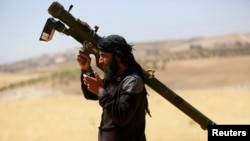The almost singular focus by the United States and some of its coalition partners on defeating the group known as the Islamic State appears to be giving new life to the group's chief rival.
U.S. intelligence officials say despite hitting a low point about 10 months ago, al-Qaida affiliate Jabhat al-Nusra has rebounded, increasingly casting itself as a critical player in the battle for Syria’s future.
“The Nusra Front’s exploitation of the Syrian conflict to advance al-Qaida’s goals suggest it will continue to align with, or combat, local forces when it fits the group’s agenda,” a U.S. intelligence official told VOA on condition of anonymity.
And there is a growing sense the group is positioned to grow even stronger.
“It would not be surprising if Nusra continued to seek opportunities to strengthen its position following last year’s setbacks,” the official said.
The turnaround for Jabhat al-Nusra might have been almost unimaginable given the way events began to play out in Syria in June of last year when the terror group chose to abandon its stronghold in Deir ez Zor rather than confront the Islamic State in battle.
Only Jabhat al-Nusra did not fade away. Instead, analysts say it “doubled down” on its outreach to Syria’s other jihadist groups, even setting up a court system to mediate and resolve disputes in order to help keep different factions united in their efforts to unseat Syrian President Bashar al-Assad.
At the same time, Nusra leaders focused on setting up a new, but smaller base of operations, choosing Idlib province in western Syria.
It is a move that has started paying off.
“The Nusra Front and its allies have maintained control,” said researcher Julie Shain with the Counter Extremism Project, adding that Nusra’s leaders have also managed to parlay that control into a newfound strength.
“The group vastly increased its superior weapons arsenal via illegal trade routes as well as through battle spoils, capturing TOW anti-tank missiles from defeated U.S.-backed rebel units,” she said.
While it may be getting stronger, U.S. intelligence officials caution Jabhat al-Nusra itself is still not nearly as big as its rival, the Islamic State, estimating Nusra had about 5,000 fighters as of earlier this year. In contrast, the U.S. estimates there are 20,000 to 30,000 fighters aligned with the Islamic State.
But the numbers can be misleading, especially with a group like Jabhat al-Nusra, which puts a high priority on operational security.
“It’s almost impossible to figure out what that actual total number is,” said Thomas Joscelyn with the Foundation for Defense of Democracies and senior editor of The Long War Journal.
Joscelyn cautions that official U.S. intelligence estimates for forces in the region, like those for the Islamic State, “don’t ring true just given the scale of the fighting and the scale of territory under control.”
“It’s clear that there is sort of a consistent problem here in the analysis, underestimating the number of jihadi fighters," he said.
Others warn what is making Jabhat al-Nusra so dangerous is a strategy that minimizes the importance of both numbers and territory.
“Nusra has exchanged that territory in Deir ez Zor for networks in western Syria,” said Syria analyst Jennifer Cafarella with the Institute for the Study of War. “It really is the power of those networks that Nusra has been able to advance.”
Cafarella said that when partnering on military offensives with larger rebel groups, like Ahrar al Sham, Jabhat al-Nusra “plays more of a specialized role,” taking advantage of its experienced and well-trained fighters.
“Nusra is regarded as a highly effective and necessary ally for a majority of Syrian rebel groups in their fight against Assad,” she said.
Analysts say it even appears Jabhat al-usra has been able to leverage that type of success into resources, siphoning off supplies and financing sent to partners seen as more moderate by countries like Turkey and Saudi Arabia.
The threat posed by al-Qaida and its Syrian affiliate has not gone unnoticed by the U.S., which has used airstrikes to target members of the so-called Khorasan Group, veteran al-Qaida operatives sent to Syria to plot attacks on the West.
One of the most recent strikes took place July 28, when according to military officials, the U.S. hit a tactical unit and vehicle near Salqin, in Syria’s Idlib province.
“I don’t think that, when we look at the campaign, significant distinctions were made between al-Nusra and ISIL,” said RAND Corporation terrorism analyst Brian Michael Jenkins, using an acronym for the Islamic State.
Jenkins, a former Green Beret, said other actions by the U.S. and its allies also targeted both groups.
“The efforts to stem the flow of foreign fighters to Syria and Iraq actually applied equally to al-Nusra and ISIL,” he said.
But ISW’s Jennifer Cafarella worries that it is the perception on the ground in Syria that ultimately plays to Jabhat al Nusra’s advantage.
“Nusra has been capitalizing on the campaign against ISIS [Islamic State] actually to wage a narrative that positions the U.S. as an alleged ally for the Assad regime,” she warned. “Nusra will argue that the U.S. is working with Iran to subjugate the Syrian people and Nusra is actually gaining traction with this narrative.”
And while there are some areas in which Jabhat al-Nusra and the Islamic State cooperate, such as areas around Damascus and Aleppo, many say Jabhat al-Nusra’s ambitions should not be dismissed.
“As Islamic State gets weaker in the Levant, perhaps the biggest beneficiary is the al-Qaida affiliate,” Northeastern University terror analyst Max Abrahms told VOA via Skype. “Will it moderate itself or will it simply try to take over the Islamic insurgency once the Islamic State has been weakened?”




